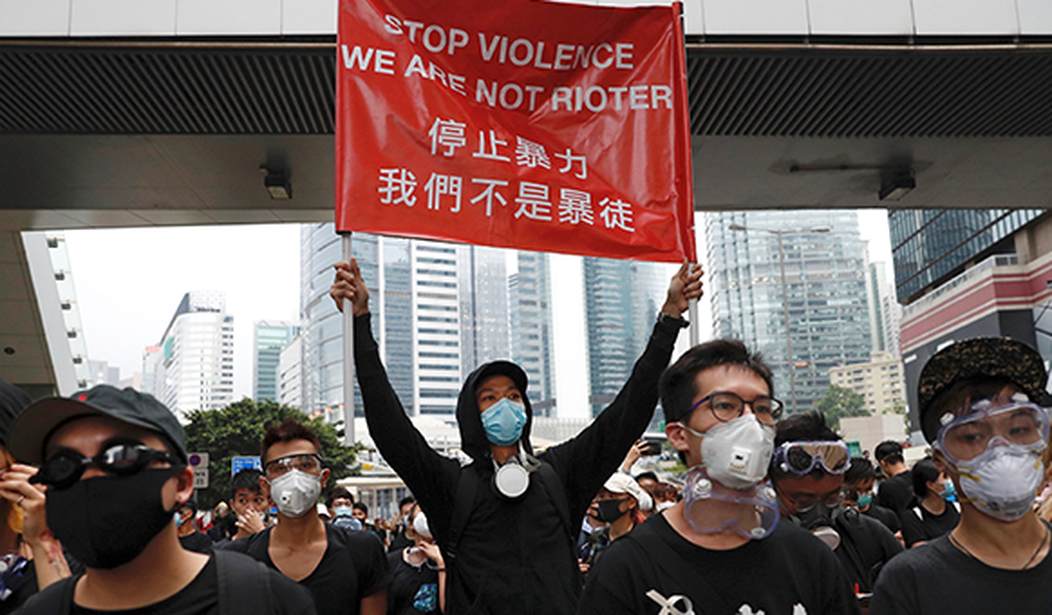Hong Kong’s autonomy is fast declining with the issue of a national security law on Tuesday by mainland China’s authoritarian government. The announcement came just a day before the annual July 1 protest to commemorate Hong Kong’s birth into the “one-country, two-systems” model.
In a statement, Hong Kong Special Administrative Region (SAR) Chief Executive Carrie Lam attributed the need for such measures to the “horrible menace” posed by violent pro-democracy uprisings. Many protestors have “crossed the ‘one country’ red line,” committing “terrorist acts” and contributing to the destabilization of Hong Kong, she said.
Lam accused Hong Kong of neglecting to enforce measures against lawlessness and claimed that imposing the new legislation is “an exercise of the authority and duty” of the National People’s Congress.
“The National Security Law seeks to practically and effectively prevent, curb and punish four types of crimes seriously endangering national security, namely acts of secession, subversion of state power, terrorist activities, and collusion with foreign or external forces to endanger national security,” Lam said.
The details of the law remain shrouded in official rhetoric. A draft described possible enforcement methods including instituting a national security agency in Hong Kong, creating a special police unit and creating a separate court that might allow for the extradition of offenders to mainland China “in rare specified situations.”
Chinese law requires lawmakers to publish draft laws for review prior to confirmation. According to the Hong Kong Bar Association, Hong Kong legal officials were not aware of the draft if it was made available.
Recommended
Last June, a proposed extradition bill sparked massive political dissent in Hong Kong by those who feared it would permit China to override Hong Kong’s special human rights protections. The bill was rescinded after waves of protests, but the new national security law could effectively replace it.
Lam assured Hong Kong people that the law would not threaten their fundamental democratic liberties and includes provisions for the presumption of innocence. Importantly for many activists who might be considered offenders under the new law, it cannot be applied in retrospect.
More specific stipulations will not be revealed until the law comes into effect.
At least one group of protesters demonstrated in Hong Kong on Tuesday.
“This is the end of a Hong Kong of free speech and the end of a Hong Kong of due process of law,” China expert Jerome Cohen told Hong Kong Free Press.
Protest leader Joshua Wong has also voiced concerns on Twitter.
[End of Hong Kong, Beginning of Reign of Terror]
— Joshua Wong ??? ?? (@joshuawongcf) June 30, 2020
1. #Beijing has just passed the sweeping #nationalsecuritylaw. It marks the end of Hong Kong that the world knew before. pic.twitter.com/QouY6Itr1O
Meanwhile, many pro-democracy groups have disbanded to preempt apprehension under the new law.
Yesterday, the Trump administration moved to restrict exports of defense equipment and dual-use technologies to Hong Kong. The United States acknowledged in advance of the legislation that, because of China’s encroachment into Hong Kong’s autonomy, “Hong Kong does not continue to warrant treatment under United States laws in the same manner as U.S. laws were applied to Hong Kong before July 1997.”
Lam moderated the effect of the sanctions and promised that Hong Kong would “actively cooperate with the central government on any counterattacks if necessary.”
A spokesperson for the Foreign Ministry said China would remain resolute in its determination to force civil restraint on Hong Kong regardless of sanctions, a state news agency reports.

























Join the conversation as a VIP Member